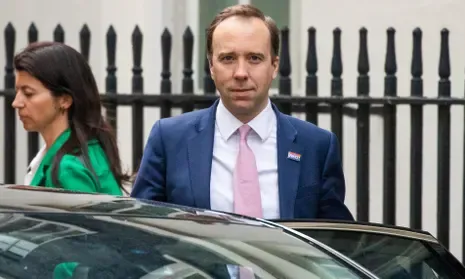Cabinet ministers are using technology that automatically deletes WhatsApp messages, raising fears that they are circumventing the Government’s transparency rules.
Some frontbench figures have switched on a function offered by the social media service that effectively means messages self-destruct after a short time period such as a day.
It calls into question whether ministers are fully following guidance that electronic messages about government policy should be stored for possible Freedom of Information requests.
Some political advisers have even switched on the technology in the wake of The Lockdown Files, which revealed some of the 100,000 leaked WhatsApp messages involving Matt Hancock.
Opposition MPs called for the practice to be stopped on Tuesday, questioning why government ministers would choose to automatically delete some messages.
The Telegraph’s reporting has shown how often Cabinet figures and senior officials used WhatsApp to have detailed discussions about Covid policy-making during the pandemic.
Such discussions are theoretically covered by the Government’s existing transparency rules, but rely on ministers deciding which messages are relevant and storing them.
The Cabinet Office has guidance on the use of private emails, which also applies to “other forms of communications and records which deal with departmental business”, such as WhatsApp messages.
The guidance reads: “The responsibility for deciding whether emails should be retained rests with the originator and recipient. In general terms, a record need only be retained if it is needed for substantive discussions or decisions in the course of conducting official business.”
How many ministers are using the automatic deletion tool on WhatsApp and for how many interactions is unclear. Similarly, it is not known how often ministers pass on WhatsApp messages about detailed policy discussions to the Civil Service to be stored.
However, the fact that some ministers are using the automatic deletion mechanism has prompted some MPs to raise concerns that not enough information is being stored.
Christine Jardine, the Liberal Democrat Cabinet Office spokeswoman, said: “Ministers should be setting an example for our country and governing with honesty and integrity, not hiding behind disappearing messages.
“We should live in an open democracy and society, and that means ministers shouldn’t be evading transparency like this.”
Writing for The Telegraph last week, John Edwards, the Information Commissioner, raised concerns about how WhatsApp messages are being stored within Whitehall.
Mr Edwards wrote: “It is incorrect to suggest that information on WhatsApp is not covered by freedom of information – if messages relate to a public authority’s official business, then they absolutely can be requested through a freedom of information request.
“But we know in reality that much of this information rests on people’s personal phones, or within personal accounts, and that it is rarely properly documented and archived.
“The issue, then, is not that WhatsApp is being used by ministers, but that policies and procedures in place across Whitehall no longer reflect how ministers and officials work and interact in practice.”
A Cabinet Office spokesman said: “In the modern age, ministers will use a variety of communication channels for discussions, so appropriate arrangements are in place for the management of electronic communications.”


